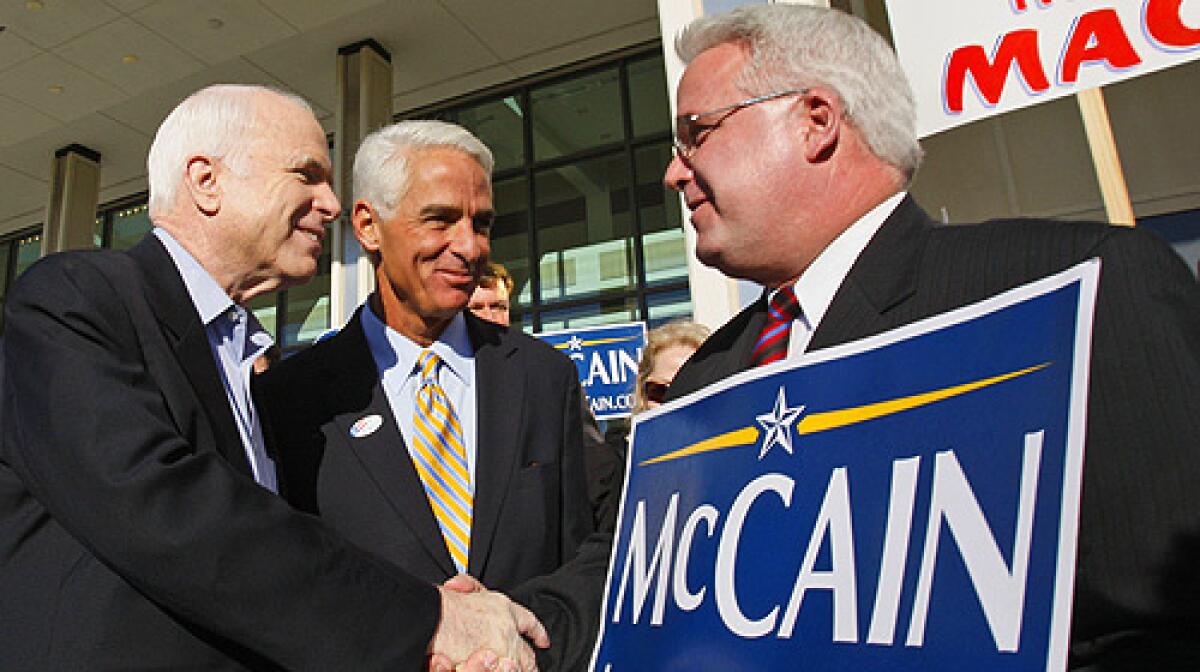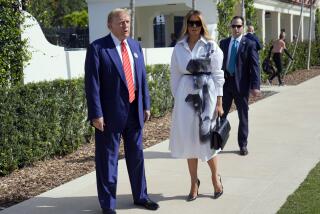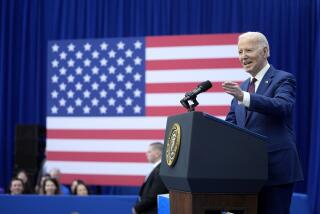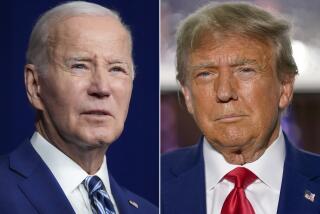Win puts McCain on top

John McCain won the Florida Republican primary on Tuesday in a contest that crowned him as the front- runner for his party’s presidential nomination and quashed the White House bid of Rudolph W. Giuliani.
Mitt Romney finished a disappointing second, but will remain McCain’s chief rival as the GOP campaign expands today to battlefields stretching coast to coast. McCain’s victory gave him new momentum for contests Tuesday in California, New York, Illinois, Georgia and 17 other states.
Former New York Mayor Giuliani finished a distant third in Florida, just ahead of Mike Huckabee, the former Arkansas governor. Giuliani’s failure to win any contests in the first month of Republican balloting crushed his once high-flying candidacy. He hinted Tuesday night that he would drop out of the race, and is expected to endorse McCain as soon as today.
For McCain, Florida’s winner-take-all prize of 57 delegates offered a measure of validation from a party that has long cast a wary eye on his tendency to break with Republican orthodoxy.
The win was especially significant for McCain because independents, a crucial force in his victories in New Hampshire and South Carolina, could not vote in Florida.
Speaking to hundreds of cheering supporters in a Miami hotel ballroom, McCain thanked voters for bringing him “across the finish line first in, as I have been repeatedly reminded lately, an all-Republican primary.”
“Our victory may not have reached landslide proportions, but it is sweet nonetheless,” said McCain, flanked by his wife, Cindy, and Florida GOP Gov. Charlie Crist, who endorsed the candidate Saturday.
With 99% of precincts reporting, McCain led with 36%, followed by Romney with 31%, Giuliani with 15%, Huckabee with 13%, and Rep. Ron Paul of Texas with 3%.
On the Democratic side, Sen. Hillary Rodham Clinton of New York defeated Sen. Barack Obama of Illinois in a contest that had no bearing on the race, beyond the symbolic value she touted in a victory appearance Tuesday night in South Florida. Late results showed Clinton with 50%, compared with 33% for Obama and 14% for former Sen. John Edwards of North Carolina.
In St. Petersburg, Romney told a disheartened crowd of hundreds that he shared their disappointment, but the former governor of Massachusetts vowed to keep fighting for delegates to the Republican National Convention.
Minutes after congratulating McCain, Romney pressed ahead with his case against the longtime Arizona senator, saying it was “time for the politicians to leave Washington and for the citizens to take over.”
“Washington is fundamentally broken,” he said. “We’re not going to change Washington by sending the same people back just to sit in different chairs.”
Romney’s wife, Ann, looking somber in a black suit, called the Florida defeat “a send-off point, not an end.”
Yet after a month of inconclusive state-by-state victories by Huckabee, Romney and McCain, the Florida primary is the first to give one candidate a clear course toward the nomination. Don Sipple, a Republican strategist watching from the sidelines, called the victory “huge” for McCain.
“He’s got the mo’ when momentum counts the most,” Sipple said. “The dominoes are all going to fall his way. I think this sets the table for him to claim the nomination Feb. 5,” when 21 GOP contests will be held, or shortly after.
Giuliani, once considered the GOP front-runner, spoke Tuesday night of his campaign in the past tense in remarks to a subdued crowd at Orlando’s Portofino Bay Hotel, but he did not explicitly abandon the race.
“In an era of personal attacks, negative ads and political spin, we ran a campaign that was uplifting,” he said.
Giuliani had been reduced to a marginal role in the Republican race for weeks. He abandoned his faltering efforts in Iowa and New Hampshire and shifted focus entirely to Florida this month.
Even so, the Florida primary turned into a two-man brawl between Romney and McCain.
In a state hit hard by troubles in the housing market, Romney played to voter worries about the economy, arguing that his success as an investment executive made him best-suited to lead a turnaround.
McCain, a Navy pilot taken prisoner of war in Vietnam and now a staunch supporter of the Iraq war, made national security his main focus.
“Who is it that has got the experience and background and knowledge to take on the challenge of radical Islamic extremism?” McCain said Tuesday at a campaign stop in St. Petersburg. “Gov. Romney has no experience there.”
With rhetoric that grew nastier by the day in Florida, McCain and Romney each portrayed the other as unfit to lead America. Romney questioned McCain’s understanding of the economy. He called McCain a liberal who was out of step with his own party on taxes, immigration and global warming.
McCain, in turn, cast Romney as a chronic flip-flopper who shifted stands on immigration, global warming and abortion, among other issues. McCain faulted Romney’s record on taxes and jobs in Massachusetts.
A distinct advantage for McCain in Florida was a spate of late endorsements. Last week he won the support of Florida’s top Cuban American elected official, Sen. Mel Martinez, along with Crist, a popular governor.
By winning Florida, McCain has put himself “in an extremely good position to win the Republican nomination next Tuesday,” said Peter A. Brown, assistant director of the Quinnipiac University Polling Institute in Connecticut.
Among McCain’s key supporters in Florida were moderates, Latinos and voters older than 65, according to an exit poll conducted for television networks and the Associated Press. And in a worrisome sign for Romney, voters who ranked the economy as the country’s top issue also favored McCain.
Advisors to Romney suggested that he could still surpass McCain by positioning himself as a more conservative alternative.
“Conservatives have a choice now, and it’s a clear choice,” said Jay Sekulow, a lawyer and Romney advisor. “You’ve got a conservative and you’ve got John McCain.”
For Huckabee, the path to the Republican nomination appears increasingly difficult, if not impossible.
His victory in the Iowa caucuses on Jan. 3 made him a serious, if underfunded, contender. But his loss just over two weeks later in the South Carolina primary showed that Huckabee, a Southern Baptist minister, could not easily broaden his reach beyond a base of culturally conservative evangelicals.
His political leanings fit some of the more conservative states voting on Feb. 5 -- Alabama and Tennessee, for instance -- but the math for Huckabee to accrue enough delegates to win the nomination appears extremely challenging.
For McCain, Florida’s prize of 57 delegates is half the size of what it could have been. The Republican National Committee stripped Florida of half of its delegates after the state scheduled its primary earlier than allowed by party rules.
(The Democratic National Committee punished Florida by taking away all of its delegates to the party’s national nominating convention this summer.)
From Florida, the Republican contenders head to California. At 5 p.m. today at the Ronald Reagan Presidential Library near Simi Valley, they will face off in a debate sponsored by The Times, CNN and Politico.com.
michael.finnegan@ latimes.com
Time staff writers Mark Z. Barabak and Maeve Reston in Miami, Louise Roug in Orlando, Seema Mehta in St. Petersburg and Dan Morain in Sacramento contributed to this report.
More to Read
Start your day right
Sign up for Essential California for news, features and recommendations from the L.A. Times and beyond in your inbox six days a week.
You may occasionally receive promotional content from the Los Angeles Times.






